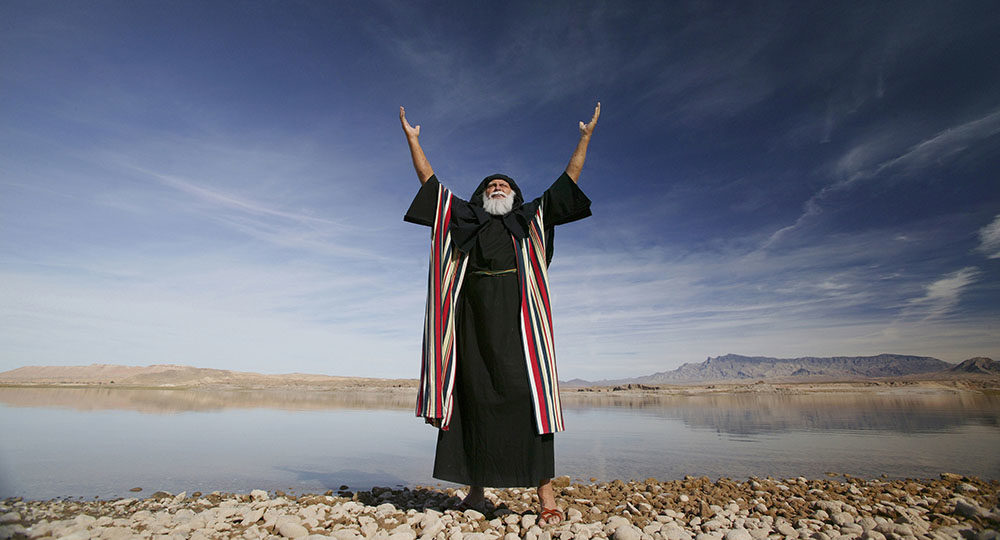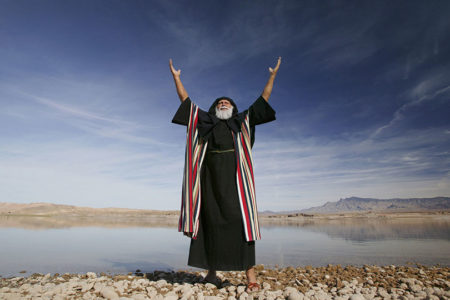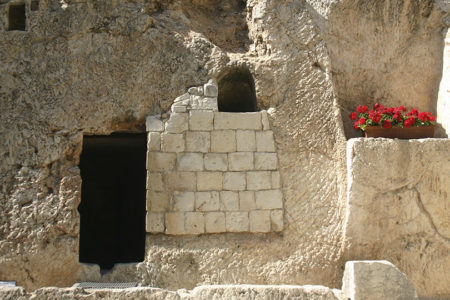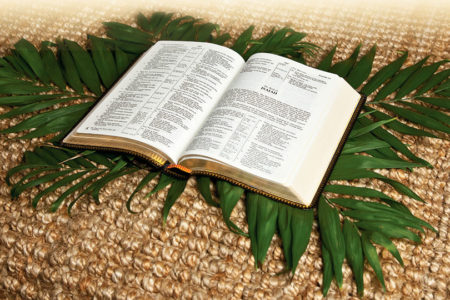Isaiah: The Royal Prophet
“It’s amazing what can be accomplished if one doesn’t care who gets the credit,” says Dr. Howard Hendricks, longtime professor at Dallas Theological Seminary. That statement could well have served as the epitaph on the tombstone of the prophet Isaiah. Isaiah prophesied both judgment and deliverance for Jerusalem and Judah, with no thought of himself. Arguably, he was the greatest prophet in history after Moses; yet, amazingly, little is known about the individual behind this impressive ministry.
The Person
Isaiah identified himself only as “Isaiah the son of Amoz” (Isa. 1:1). There are 12 other such references, including three in 2 Kings and 2 Chronicles. Amoz is never identified, described, or even mentioned apart from this statement. Though some have suggested Isaiah may have been of priestly lineage, nothing in the Bible supports that view. Isaiah means “salvation is of Yahweh” or “Yahweh is salvation.” His name is probably significant, but it is never explained or elaborated on.
The only other autobiographical information concerns Isaiah’s family and is provided in conjunction with his ministry to Judean King Ahaz. When Judah was threatened by the Samaria-Syria Alliance (Isa. 7—12), the Lord instructed Isaiah, “Go out now to meet Ahaz, you and Shear-Jashub your son” (7:3). God then gave stubborn Ahaz a sign:
Therefore the Lord Himself will give you a sign: Behold, the virgin shall conceive and bear a Son, and shall call His name Immanuel. Curds and honey He shall eat, that He may know to refuse the evil and choose the good. For before the Child shall know to refuse the evil and choose the good, the land that you dread will be forsaken by both her kings (vv. 14–16).
Isaiah said his second son was the near-view fulfillment of this prophecy for Ahaz:
Then I went to the prophetess, and she conceived and bore a son. Then the Lᴏʀᴅ said to me, “Call his name Maher-Shalal-Hash-Baz; for before the child shall have knowledge to cry ‘My father’ and ‘My mother,’ the riches of Damascus and the spoil of Samaria will be taken away before the king of Assyria (8:3–4).
Isaiah called his wife a prophetess, making her one of only four women so positively labeled in the entire Old Testament. His home appeared to have been a godly one.
His ministry and writing reveal additional characteristics. His ministry spanned 60 years, from the end of King Uzziah’s reign through Jotham, Ahaz, and all of Hezekiah’s reign; and Isaiah appeared comfortable moving in and out of the presence of these kings.
Many Old Testament scholars note his rich vocabulary. H. C. Leupold wrote, “Hardly anyone would question the claim that Isaiah is a prince among prophets. His eloquence is very evident….He has at his command a vocabulary richer than that of any prophet, even more comprehensive than that of the Book of Psalms.”1
Certainly not a sheepherder like the prophet Amos, and likely not a priest like Ezekiel, Isaiah was a prophet of the princes and a prince of the prophets. His writing gives the impression that he moved with grace through the culture of his day. He spoke forcefully and specifically to the international issues of his time, even looking far ahead to the judgment of Babylon and the rise of Cyrus of Persia.
But personal holiness in the midst of a spiritually declining culture often comes with personal and professional loneliness.
The Place
The glory days of Kings David and Solomon were 200 years in the past. The southern kingdom of Judah and the northern kingdom of Israel had coexisted reasonably well. Israel consistently resisted a genuine relationship with Yahweh, while Judah vacillated between good and bad kings. The good kings provided positive spiritual encouragement, though they did not rise to the level of their father David.
Isaiah was sent to a nation whose faith had become jaded. Amaziah, who reigned 29 years, is described as a good king who “did what was right in the sight of the Lᴏʀᴅ, yet not like his father David; he did everything as his father Joash had done. However the high places were not taken away, and the people still sacrificed and burned incense on the high places” (2 Ki. 14:3–4). Uzziah (also called Azariah), who reigned 52 years, and Jotham (reigned 16 years) are described with nearly identical words (15:3–4, 34–35).
Then came Ahaz who reigned 16 years:
He did not do what was right in the sight of the Lᴏʀᴅ his God, as his father David had done. But he walked in the way of the kings of Israel; indeed he made his son pass through the fire, according to the abominations of the nations whom the Lᴏʀᴅ had cast out from before the children of Israel (16:2–3).
By contrast, Hezekiah, probably due in part to Isaiah’s godly ministry, was a righteous king:
He did what was right in the sight of the Lᴏʀᴅ, according to all that his father David had done. He removed the high places and broke the sacred pillars, cut down the wooden image and broke in pieces the bronze serpent that Moses had made; for until those days the children of Israel burned incense to it, and called it Nehushtan. He trusted in the Lᴏʀᴅ God of Israel, so that after him was none like him among all the kings of Judah, nor who were before him (18:3–5).
These were prosperous times for Judah. The Lord blessed Judah’s kings when they ordered their ways before Him, but He chastised them when their pride turned them away.
Each cycle of chastisement and blessing seems to have produced a cumulative downward spiral in the nation’s spiritual health. Personal comfort often produces spiritual carelessness. Sin, even after it is forgiven, leaves lasting consequences on everyone it has touched.
The Preaching
After receiving a personal vision of the Lord’s glory, Isaiah was sent to proclaim God’s judgment on his people. Sadly, God warned him that their hearts would be “insensitive, their ears dull, and their eyes dim” (Isa. 6:10 NASB). When the prophet asked, “Lord, how long?” God replied, “Until the cities are laid waste and without inhabitant, the houses are without a man, the land is utterly desolate” (v. 11).
Isaiah’s prophecy has two distinct parts. Chapters 1 through 39 focus primarily on God’s impending judgment on Judah and Jerusalem (also on the surrounding nations, notably Babylon some 200 years in the future). Throughout these messages, Isaiah reminded his people that deliverance was available at the sovereign hand of their God. The first half ends with the detailed account of Hezekiah’s prayer that God would hallow His name, which Assyrian official Sennacherib was belittling, and that God would deliver the Israelites by destroying the Assyrian army. Despite the fact God answered this prayer with a miraculous deliverance, Judah continued to rebel against Him, bringing about its downfall.
Chapters 40 through 66 focus on God’s salvation for His people after they have been chastened for their sin against Him:
“Comfort, yes, comfort My people!” says your God. “Speak comfort to Jerusalem, and cry out to her, that her warfare is ended, that her iniquity is pardoned; for she has received from the Lᴏʀᴅ’s hand double for all her sins” (40:1–2).
Refusing to be likened to any other being, the Lord affirms His sovereign control over all the nations. He promises to raise up His Servant who will bring deliverance to His people and to remove Jerusalem’s chastening:
Therefore please hear this, you afflicted, and drunk but not with wine. Thus says your Lord, the Lᴏʀᴅ and your God, who pleads the cause of His people: “See, I have taken out of your hand the cup of trembling, the dregs of the cup of My fury; you shall no longer drink it” (51:21–22).
For behold, I create new heavens and a new earth; and the former shall not be remembered or come to mind. But be glad and rejoice forever in what I create; for behold, I cre-ate Jerusalem as a rejoicing, and her people a joy. I will rejoice in Jerusalem, and joy in My people; the voice of weeping shall no longer be heard in her, nor the voice of crying (65:17–19).
God’s warnings to His people are always buffered with words of hope, and His promises of deliverance are usually sobered with reminders of chastening. Isaiah prophesied both judgment and deliverance for Jerusalem and Judah with no thought (and hardly any mention) of himself. The result is the majestic presentation of Yahweh’s glory and His promise to glorify His people through the future Servant’s Kingdom.
ENDNOTE
- C. Leupold, Exposition of Isaiah (Grand Rapids, MI: Baker Book House, 1968), 1:14.








Three of Judah’s kings during Isaiah’s ministry were considered Godly: Uzziah, who reigned 52 years, Jotham, who reigned 16 years and Hezekiah, who reigned 29 years. Ahaz, the wicked king of the group, reigned 16 years.
Why was God’s judgement, through Isaiah, so harsh on Judah when most of their kings during his lifetime were Godly?
You don’t get full details on why God chewed out Judah so much, perhaps the reasoning is the king was righteous but not so much the people. Most of the time those three reigned the high places were never taken away. Israel was restricted from offering sacrifices in high places because the priest were required to do it in the temple. If the people were offering burnt offerings elsewhere without a priest, who were they offering too?
Just my thought on it.
Serving God is not like the lottery. The Bible teaches us that we should …serve the Lord with a whole heart. It appears that Judah does have mostly good kings but it only takes a little leaven to spoil the lump. Obviously partial obedience is not obedience at all.